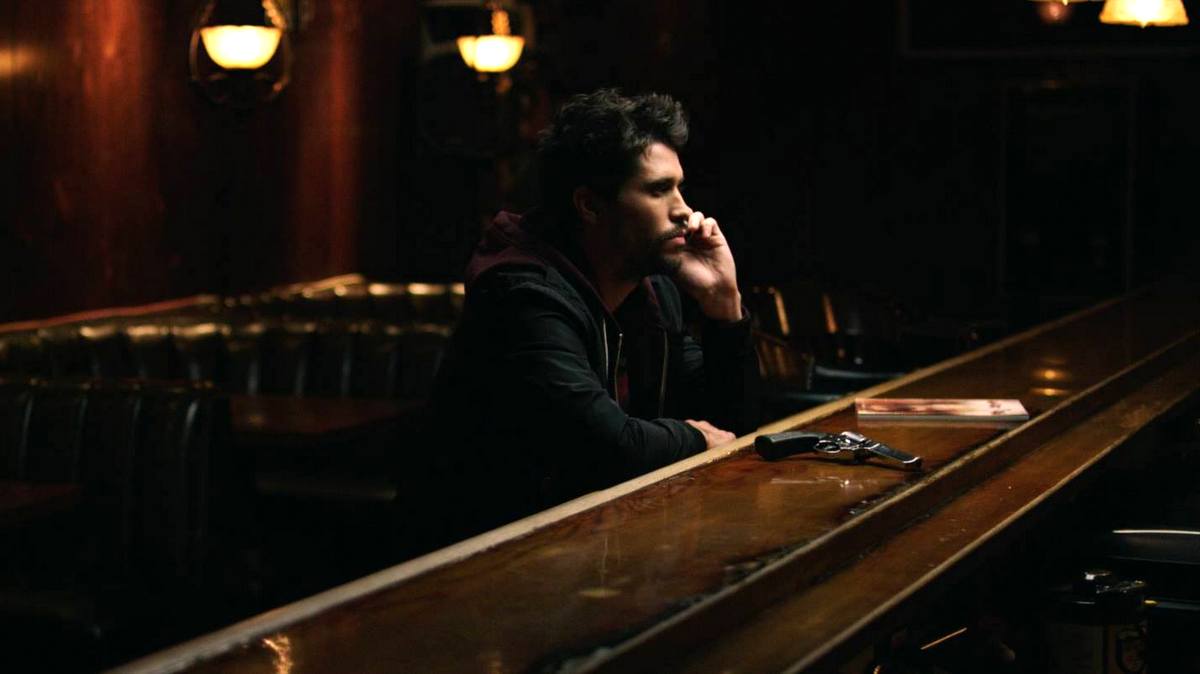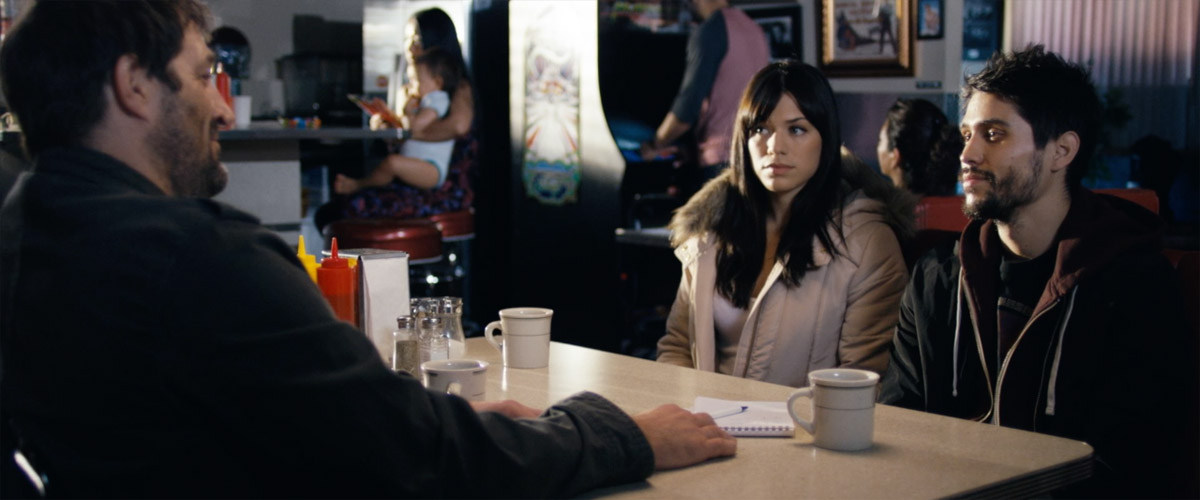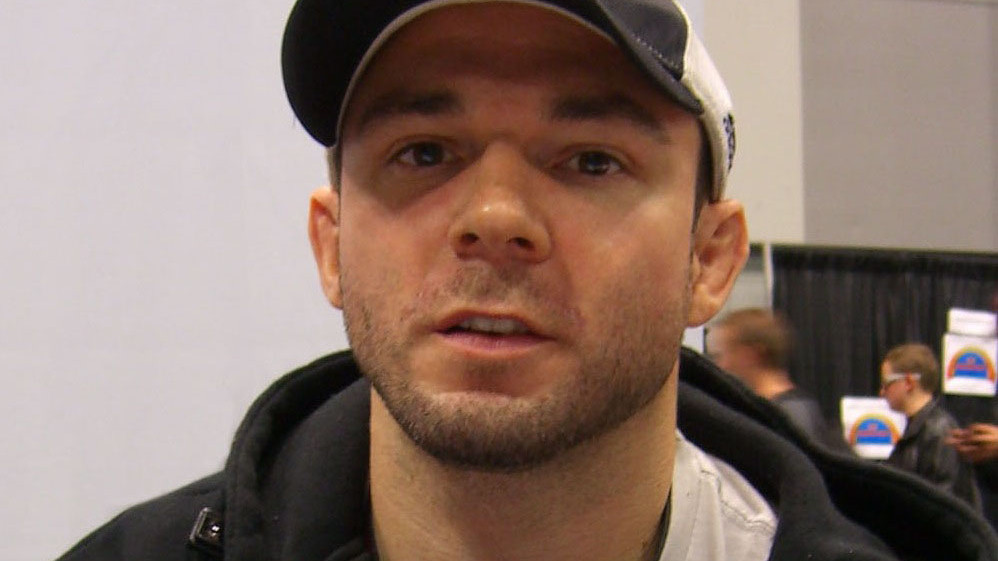
Frank Raducz Jr. as Jay in Suburban Cowboy
I love every part of the process. I got into filmmaking to make movies. Not to take lunches. Not to try and be cool in LA. Not to walk red carpets. Not to date actresses. I went to producing school and got my MFA from USC for three reasons; it’s the best film school in the world, they were crazy enough to let me in… and I knew that the way for me to become the best filmmaker possible was to understand the process from start to finish.
With Suburban Cowboy, I wrote, directed, and was the lead producer and also the editor. It was the first project that I got to do exactly how I wanted – meeting every cast and crew member personally before bringing them on. And it turned into a fine-tuned set. In fact, we were so efficient that we only went into overtime on one day and were able to shave a day off our shoot schedule – on what was a micro-budget film, which is pretty rare. I need to give credit to the cast and crew though. Regardless of how many hats I wear, filmmaking is a group effort and I had some people working on the film at reduced rates out of sheer belief in me.
Suburban Cowboy is inspired by true events. Someone I know pretty well was involved in the weed trade and when he got out of prison the first time he passed me a notebook that he called an autobiography. It was very episodic and didn’t really add up to much… but the world was exciting to me. The idea that the really normal looking guy who lives next to you is a criminal is interesting.
When people conjure up drug dealers and crime lords, they are these stocks characters in genre films. So I wanted to make something that was more realistic, especially for where I grew up on Long Island. I cherry picked some of the best stories he had and crafted something that actually had a plot, and I leaned on him and a few other friends in terms of making the smallest details as realistic as possible.
indieactivity: Did you start writing with a cast (You or any) in mind?
Ryan: Short answer, no. I didn’t want to bring more baggage than the script already had (being based on true events). However, the lead character (Jay) is not based on the same guy. He’s my own creation… while hopefully still staying as true to the world as possible.
There are two specific films that influenced how I saw the lead, Pusher by Nicholas Winding Refn and Un Prophete by Jacques Audiard. In Pusher, I love how terrible Frank is at his job. He was clearly never going to rise above the level he was at in the criminal network. In terms of physicality and presence, I was hoping for something like Tahar Rahim’s Malik from Un Prophet. He was a hustler who wasn’t physically imposing, but also wasn’t a pushover. He was stoic when he needed to be, but able to talk his way out of situations.

Suburban Cowboy
indieactivity: How long did you take to complete the script? (Do you have a writing process?)
Ryan: It took me about two years from the first key strokes of the outline to a finished script. That said, it wasn’t the only project or script I was working on over that time. The person I was working with on the story was actually arrested as I finished the first draft. So, I rewrote the ending to reflect what was happening there, as it was better than the original ending. Of course things changed based on final budget, locations and cast.
indieactivity: Do you have a production coy? When did you form it and why?
Ryan: It is called Spoke Lane Entertainment. I started it mostly for tax/financial reasons. It’s ten years old at this point, but I’m still the only employee (although I consider Zsombor Huszka the other half of the company – he did the animation for the film, draws my graphic novels and is my partner on two animated films in production).
I definitely rushed into creating a company – because I thought that was what you were supposed to do (even after going to a grad program for producing). California has a ridiculous $800 a year LLC fee, even if you make zero dollars. That’s over and above the cost of starting an LLC. So, you don’t need a company – you need projects. If you start striking agreements for properties/scripts/writers/etc then you should have a company to insulate yourself. But every film produced is a new LLC. If I had to do it over again, I would save all that money until the very last second I absolutely needed to create a company.
indieactivity: What was the first project out of the gate?
Ryan: My first project through Spoke Lane was actually a graphic novel, Harbor Moon – which is featured pretty prominently in Suburban Cowboy. Although my first project was as a producer on Battle for Terra: 3D, which was released in 2009 by Lionsgate. I helped launch a company right out of grad school at USC with a classmate and we were on the hunt for a small project to produce/finance, but could not find anything. We didn’t set out to make an animated film at a facility we built from scratch, but it was the only project that appealed to us at the time.
indieactivity: During production, what scene (that made the cut) was the hardest to shoot?
Ryan: There is a scene (which was actually about six scenes in the script) where the lead actor gets out of a car and we follow him into the house, through the house, he wakes up his girlfriend and then drags her outside the house where she gets in the car and takes off – in the rain… all in one shot with no cuts. It took 13 dry takes and 14 takes with the rain towers on, but it was awesome.
indieactivity: What works better in this latest production that mightn’t have worked so well in the last one?
Ryan: From the last to this film, or any previous film to the next, the thing that always works better for me is crew. With each film I have found certain positions that I hope to keep for every subsequent film. Like Jakob Lofberg at DP, Zsombor Huszka doing anything that involves animation or artwork, Jason Calabro on the Producing/Line Producing end, Yusuke Tateishi doing make-up, Alberto Moreno aka The Patron doing behind-the-scenes… to name a few.
Suburban Cowboy was the first time I was able to make a film with total control; where I was able to meet every single crewmember before they were hired – down to the Production Assistants. And it was an amazing experience that translated into a supremely efficient set. Not only did we only go overtime once during the shoot, but we were able to shave a full day off our schedule. That’s pretty insane when you consider we had 20-something locations on a 16 day shoot schedule, with a micro-budget.

indieactivity: You directed the film, what measure of input did it take?
Ryan: It’s hard to quantify, because directing is such an immersive experience. Maybe because I also wrote and was the lead producer on the film it is different, but I had input on every single detail from every line of dialogue to sitting with the colorist on the final look.
indieactivity: Is there anything about the independent filmmaking business you still struggle with?
Ryan: Staying patient. I am a workaholic and need to constantly be moving forward. We finished this film over a year ago. Then we had to wait for its festival premiere… and then the distributor needed at least six months to prepare for the release. I have a lot of projects in various stages, so I’m able to stay sane… for the most part.
indieactivity: Where do you think your strengths lie as a director?
Ryan: Comprehension. I’d love to say composition or I’m a theatre actor turned director – but I can oversee the process from development through the sale of the film by myself if need be. I can step in on set and fill in for any position – maybe not well, but I can do it. I do not like anyone having leverage on me… and in filmmaking that means someone that knows more than you.
There will always be people way more skilled/talented than I am. But if you know nothing about lighting or equipment or sound, then you are at your crew’s mercy – and this is extremely important when making independent films when it comes time to budget and schedule them. Or when you are on set fighting for something. You absolutely don’t want me to record the sound on your movie, or be your gaffer… but I know the position.
I’m hoping that as my career grows and the films grow… I can worry less about those things and focus more on the smallest details of what is on the screen.
indieactivity: Let’s talk finance, How did you finance the film?
Ryan: Mitigating the investor’s risk with a project that was financially feasible while presenting them with a clear plan for recoupment. That involved hard numbers, through the budget, schedule, etc…
My previous film with Dragan Roganovic (aka Dirty South to electronic music fans) went to #1 on iTunes in the US and 16 other countries. After that it was less, ‘are we going to do something next’ and more, ‘what is next?’ He read Suburban Cowboy and it was like he could see the score/soundtrack immediately, which I’m sure is the first step for him mentally… and it was off to the races.
indieactivity: How much did you go over budget? How did you manage it?
Ryan: I didn’t. In fact, I came in under budget. For an independent feature with 20-something locations and almost 30 speaking parts, that is not normal.
indieactivity: How important is marketing? Do you think a project can make any dent without it these days?
Ryan: You can make the greatest indie film ever – but if no one knows it exists then what was the point? We came out digitally in 300 million homes on August 11th. It sounds awesome, but how does even one person know about the movie? In a time where choices almost feel unlimited – not just for competing titles, but for things other than movies – marketing is vital.
That’s one area where I’m deficient. I can write a movie. I can produce a movie. I can edit a movie. (whether or not I do any of that well remains to be seen)… But reaching an audience and getting the word out is something I know very little about. Hopefully I get better and better at it, but I’ve been working with an amazing publicist/publicity team (Clint Morris/October Coast). Without him I’d be lost.

Ryan Colucci writer, director and producer of Suburban Cowboy
indieactivity: Can you tell us about your marketing activities on the project – and how it’s gone for you?
Ryan: It’s been all word-of-mouth, interviews or reviews. You have to assume there will be people that hate your creation, but for the most part the reaction has been great. Any traction that we’ve gotten so far I have to credit our publicist, Clint Morris and the team at October Coast.
indieactivity: What do you hope audiences get from Suburban Cowboy?
Ryan: The film is a raw, authentic look into a world that you don’t see in your every day travels, but you know is there… I’d love for people to watch the film and be unnerved by it, just knowing that this world exists right under your nose, but also enjoy the ride you go on.
For that to happen people need to actually watch the film. So my hope, more than anything, is that as many eyeballs as possible see it.
indieactivity: What else have you got in the works?
Ryan: I’m currently co-directing Orient City, a hand-drawn animated samurai spaghetti western with Zsombor Huszka (who did the animated titles for Suburban Cowboy). We just finished the short film, but dove right into the feature. I just returned from a few months in Budapest laying out the storyboards.
Up next for me on the live action side is a contained sci-fi thriller called Andover, the project written by Dikran and Rylend. You never know what will happen in terms of financing, so I wanted a project that could be done at the same budget level as Suburban Cowboy, but with the ability to stretch that money further (limited locations, small cast).
Those guys crushed the script and with Suburban Cowboy getting a modicum of recognition there is interest in doing it at what can best be described as a non-micro budget. At a certain budget level you lose your ability to take risks creatively and make something different, so we’ll see how fast it can come together. As nice as it would be to take a step up, I don’t want to be on the shelf that long.
Right now, I’ve carved out some time to promote Suburban Cowboy. So if it sounds at all interesting… give us a shot. It is currently available for rent/purchase digitally; iTunes, Amazon, Google Play, Xbox, Vudu, Dish, DirecTV, On Demand (Time Warner or Comcast)!
Apple TV picks up “Dismissed” by Aysha Scott After it Hit a Million Views
Single mother entrepreneur from South-East London, built up an empire from scratch.
MOEDER Oscar® Qualified Drama Based on MH17 Airline Disaster
OSCAR® Qualified MOEDER tells a story tragedy on the Ukrainian-Russian border
Nate & John Oscar® qualified Animation Short Directed by Jumai Yusuf
NATE & JOHN heartwarming animation short qualifies for the 97th Academy® Awards
Dreama Team by Chad Weber & Steve Vanderheide Acquired by Freestyle for November Release
Feature Documentary Dreama Walton Sets Digital Debut for Global VOD Platforms and on DVD on Nov 1, 2024
LGBTQ+ Film, “Muscat” by Philippe Grenier Qualified the Oscars®
Muscat is an audacious exploration of a young boy confronted with the discovery of his identity
Joy of Horses by Ava Justin acquired by BMG Global
Joy of Horses by Ava Justin, now available across digital streaming platforms
Vanessa Valente Talks Reality TV, Online Bullying and Healing on Sisters Uncensored Podcast
The Temptation Island’s reality TV star joins Sisters Uncensored Podcast October 16th
Oscar® qualifying Sunflower: A story of resilience in a war-torn country
Mateusz Balcerek’s Oscar® qualifying Sunflower is an extraordinary story of resilience in a war-torn country









